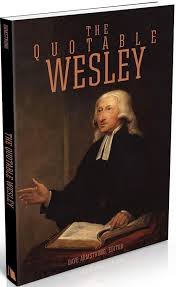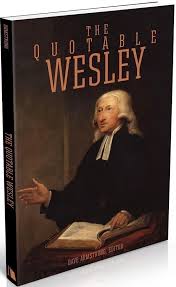 Dave Armstrong, ed., The Quotable Wesley (Kansas City, MO: Beacon Hill Press, 2014). Paperback
Dave Armstrong, ed., The Quotable Wesley (Kansas City, MO: Beacon Hill Press, 2014). Paperback
The past decade have witnessed a remarkable resurgence of Calvinism among evangelicals. Collin Hansen famously described this movement as “young, restless, Reformed” in his book of that title. The book’s cover included a young man wearing a T-shirt with Jonathan Edward’s visage on it, surrounded by the legend, “JONATHAN EDWARDS IS MY HOMEBOY.”
Those of us who are not Calvinists—I’m Pentecostal—could use our own homeboy, and I’d like to suggest that it be John Wesley. There are several reasons for this: (1) Wesley worked alongside Calvinists such as George Whitefield to advance the gospel, remembering to distinguish the evangelical core they held in common from the Calvinist elements that divided them. This is a model for us today. (2) Though not a systematic thinker like Edwards, Wesley was a comprehensive thinker whose sermons, pamphlets, tracts, and commentaries ranged across the whole counsel of Scripture. (3) Wesley not only organized the church for revival, he also motivated Christians to engage in social reform. This inside-outside strategy is once again needed in the early 21st-century American church.
The problem is that like Edwards, Wesley was a voluminous writer. The Bicentennial Edition of The Works of John Wesley runs to 26 volumes, 19 of them currently in print. Thomas Oden has just completed a four-volume John Wesley’s Teachings, with an outline of his understanding of God and providence, Christ and salvation, pastoral theology, and ethics and society. While these illuminate the comprehensive character of Wesley’s thought, quoting him at length, it’s not always easy to find Wesley’s sentiment on a given topic.
With The Quotable Wesley, Dave Armstrong provides an A–Z compendium of Wesley’s thinking. (Literally. Armstrong starts with ABSOLUTION and works through the alphabet to ZEAL.) Some of Wesley’s comments are made aphoristically, such as this one from the section, CHURCH FATHERS: “We prove the doctrines we preach by Scripture and reason and, if need be, by antiquity.” Other comments are made at length, such as the numerous entries on ATONEMENT, both against Calvinism’s limited atonement and in favor of Arminianism’s universal atonement.
Several themes quickly emerged from my perusal of this book:
First, Wesley was a thoroughgoing evangelical in the gospel-sense of that word. He believed that we are justified by grace through faith apart from works, a justification made necessary because of our sin, both original and personal. Through these affirmations, Wesley outlined a core of doctrine and preaching that can unite evangelicals whether they are Arminian or Calvinist.
Second, Wesley was a thoroughgoing Arminian, for lack of a better term. He cited chapter and verse of Scripture, not to mention logic and the church fathers, against the Calvinist doctrines of unconditional election, limited atonement, and irresistible grace. Armstrong had many selections from Wesley’s works to choose from to illustrate Wesley’s doctrine, and he chose well.
Third, Wesley was a committed Anglican, though not blind to its failings. Those who are accustomed to the controversies currently roiling the worldwide Anglican communion will be either surprised or encouraged by Wesley’s affirmation, “[My doctrine is] of the Bible, of the primitive church, and, in consequence, of the Church of England.” He did not hesitate to work outside the system—through field preaching and lay assistants, for example—when it became necessary to do so. Toward the end of his life, elements of the Methodist movement began to form themselves into a church separate form the Church of England. Wesley opposed this, though less strongly than his brother Charles. He was pragmatic enough to know that it might accomplish good work.
Fourth, as a Pentecostal, I was appreciative of many of Wesley’s remarks on cessationism, demonic possession, and healing, though less so of his remarks on tongues. How can one not appreciate this remark, on the real origin of cessationism: “This was a real cause, why the extraordinary gifts of the Holy Ghost were no longer to be found in the Christian church; because the Christians were turned heathens again and had only a dead form left.” I felt my heart strangely warmed reading these words.
Fifth, of course, is Wesley’s insistence on personal sanctification, community, and social reform.. He defined sanctification as “an inward thing, the life of God in the soul of man; a participation of the divine nature; the mind that was in Christ; or, the renewal of our heart after the image of him that created us.” But while sanctification happened in the life of the individual person, the Christian life was not individualistic. “Christianity is essentially a social religion and to turn it into a solitary religion is indeed to destroy it.” A life of holiness led ineluctably to social reform. Regarding “distilled liquors,” he wrote: “were it in my power, I would banish them out of the world.” Regarding slavery: “I absolutely deny all slave-holding to be consistent with any degree of natural justice.”
I could go on, but you get the point. Wesley presents a form of the Christian religion that is biblical, rational, and traditional. It appeals to head and heart, faith and works. It applies to the individual, the church, and society as a whole. Such a comprehensive, holistic vision of Christianity is a pressing need of our times.
Many thanks to Dave Armstrong for organizing choice quotes topically and in one concise volume.
P.S. If you found my review helpful, please vote “Yes” on my Amazon.com review page.”

